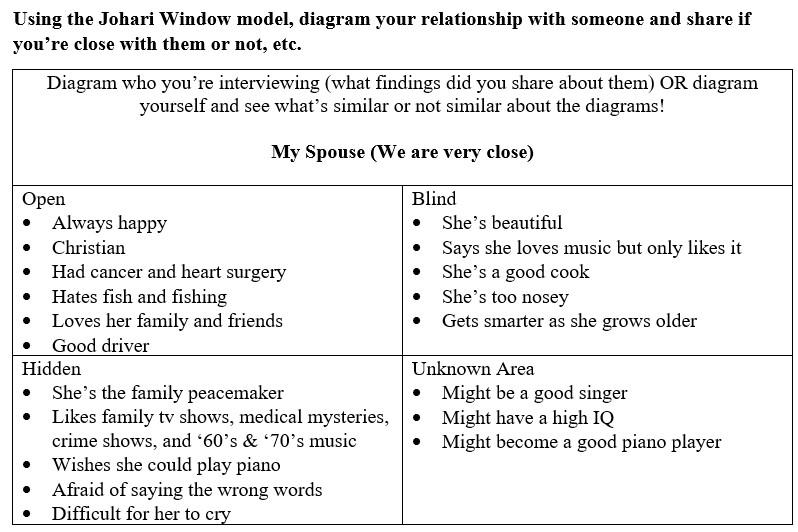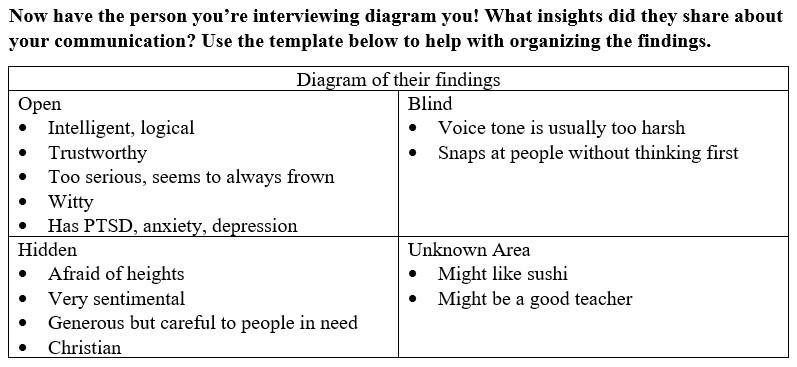
What insights can you draw from this?
She would be a good role model for younger and older people. She has good interpersonal skills and is always trying to improve herself. She wants to make everyone happy. She has had many bad medical experiences but never complains. Her appearance makes her unhappy. Being too nosey (blind) supports her love of her family (open). Social comparisons of herself to others causes some of her blindness and keeps some of her attributes hidden.
How did information move from your Hidden quadrant to your Open quadrant, or from your Blind to Open quadrant?
Her dislike of fish and fishing are mainly hidden, but she will bring it out into the open when necessary (such as at restaurants). She was blind to the fact that others think she is a good driver, but as we talked, she understood that it was open knowledge. She is not reluctant to self-disclose things to me but is very reluctant to do so openly. Her beauty seems to be hidden from herself, but it is obvious to me. I wanted to move it to the open quadrant but had to leave it in the blind quadrant.

What information is in the quadrants that you weren’t expecting?
I was not surprised at most of the findings. I’m fairly self-aware. I was surprised at how much I affect others by my snappy and short answers to their questions and comments.
What would you both put in the four quadrants about yourself (this can be brief to help with comparing and word length of paper)?
I would add my love of music and love of animals to the open quadrant. I would add that I might have been a good policeman in the unknown quadrant. In the hidden area, I would add how much I miss old television and movie stars who are dead now.
What insights can you draw from this diagram and how does that person see you?
I suppose that the things in the hidden quadrant are not hidden anymore. From the blind quadrant, I see that I have much room for self-improvement. If a friend had interviewed me instead of my spouse, I’m sure that the results would be very different.
Was this your reflected appraisal of yourself?
It was to some degree. I tend to think too highly of myself. I don’t realize how mean my tone of voice can be until it is too late. I expect more of myself than is possible. I do not make social comparisons between myself and others; I know how I want to be, but don’t have any role models. I remember my abilities when I was younger and know that many are now gone.
How did things move from the Hidden quadrant to the Open quadrant, or from your Blind to Open quadrant, with that person?
The things did not actually move from one quadrant to another. I accept that I am “in process” and that I have to accept myself as I am, so I tried to answer the interview questions honestly.
Conclusion
I agree with the guidelines in the textbook for enriching the self toward maintaining a healthy identity. I accept that I am always in process, and always becoming. I try to be fair to myself in evaluating my abilities and shortcomings, especially when comparing my current abilities with those I had when I was young. My family is proud that I am back in college at my age, trying to improve myself and achieve my old goal of obtaining a degree. Most of my friends and family have believed that I have a degree for 50 years or so and are shocked when they find out that I do not. I kept that information in my hidden quadrant, but I have never lied about it. I accept that I cannot change the past, but I wish I could. I am not generous with myself when it comes to compassion. I do need a healthier identity, and I hope it is not too late. My immediate goals are to learn to use a better tone of voice when communicating with everyone, and to not be so short and snotty with them. I believe that I am guilty of self-sabotage though. I tend to destroy my own motivation at times. But I have not totally given up on myself.